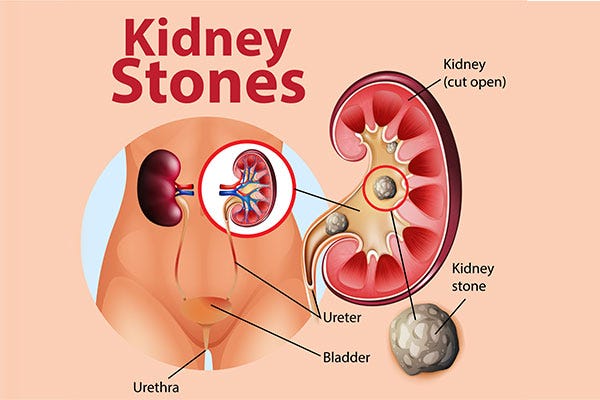Kidney stones, medically termed nephrolithiasis or renal calculi, are solid deposits of minerals and salts that form within the kidneys or urinary tract. They can vary in size, ranging from tiny particles to large stones that can cause severe pain and complications. The treatment approach for kidney stones depends on several factors, including the size of the stone, its location, and the symptoms it causes.

Here are the primary treatment options available:
- Watchful Waiting (Monitoring):
- Small kidney stones (usually less than 5mm) may pass out of the body on their own without medical intervention. During this period, patients are advised to drink plenty of water to help flush out the stone and relieve symptoms.
2. Medications:
- Pain Medications: Nonsteroidal anti-inflammatory drugs (NSAIDs) such as ibuprofen or acetaminophen are often prescribed to manage pain during the passage of the stone.
- Alpha Blockers: These medications relax the muscles of the ureter, making it easier for the stone to pass.
3. Extracorporeal Shock Wave Lithotripsy (ESWL):
- ESWL is a non-invasive procedure where shock waves are used to break up the kidney stones into smaller pieces that can then pass out of the urinary tract more easily. It is typically used for stones that are smaller than 2cm in diameter and located in the kidney or upper part of the ureter.
4. Ureteroscopy (URS):
- URS involves passing a thin, flexible scope through the urethra and bladder into the ureter and kidney to directly visualize and remove the stone. This procedure is effective for stones located in the lower ureter or kidney.
5. Percutaneous Nephrolithotomy (PCNL):
- PCNL is used for larger kidney stones or when other treatments have failed. It involves making a small incision in the back and using a nephroscope to directly remove or break up the stone.
6. Surgery:
- In rare cases where other methods are not feasible or successful, traditional open surgery (nephrolithotomy) may be required to remove very large or complex kidney stones.
7. Preventive Measures:
- Once a kidney stone has been treated and removed, preventive measures are crucial to reduce the risk of recurrence. This includes dietary changes (such as reducing sodium and animal protein intake), staying well-hydrated to maintain urine volume, and medication (such as thiazide diuretics or citrate supplements) depending on the type of stone.
The choice of treatment depends on the specific characteristics of the kidney stone and the patient’s overall health. It is important for individuals who have experienced kidney stones to work closely with their healthcare providers to develop a personalized treatment and prevention plan to minimize the chances of future episodes. Prompt treatment can alleviate symptoms, prevent complications, and improve overall kidney health.
Comments
Post a Comment